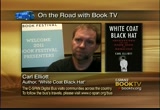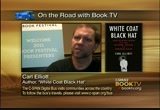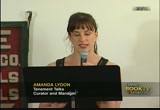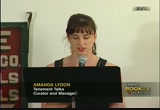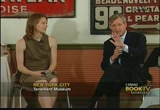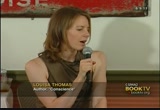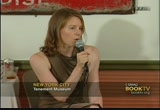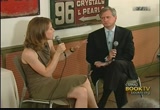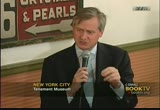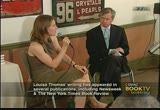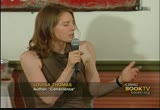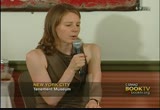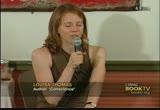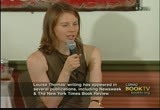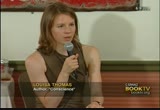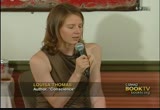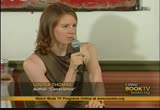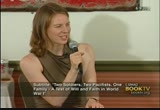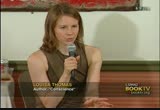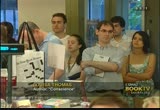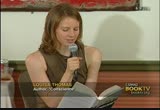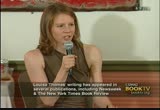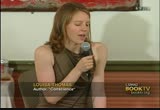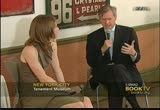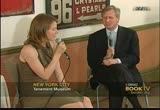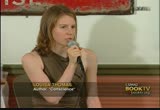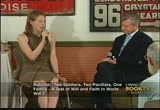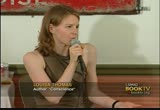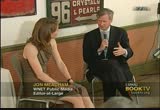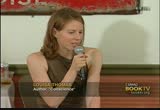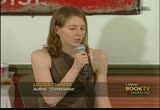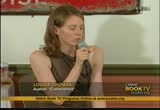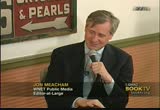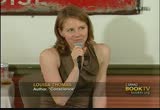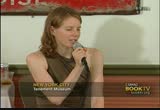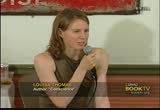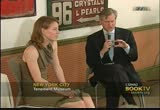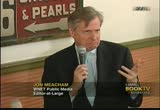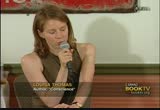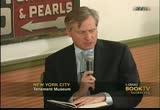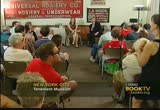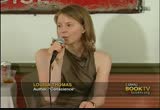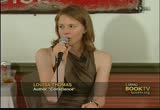tv Book TV CSPAN July 10, 2011 10:45am-11:30am EDT
10:45 am
>> what would your recommendations be to improve the medical industry, and particularly that process? >> um, well, there needs to be a different system of oversight of clinical trials. it's crazy to have the main oversight bodies being paid by the sponsors of the studies that they're supposed to be regulating. i mean, that's just a recipe for the kind of problems that we see. i would say that we need to take drug testing out of the hands of the producers of the drug. why should the pharmaceutical industry be responsible for testing their own drugs and then publishing the research? they have a financial incentive to come up with results that are positive for their products. and, um, you know, as long as the testing process is in their
10:46 am
hands, that, you know, that incentive is always going to be there. so i'd be in favor of taking truck testing out of their hands -- drug testing out of their hands and putting into an independent drug testing body. >> thank you. >> next on booktv, at the tenement museum in new york city, louisa thomas recounts the life of her great grandfather, hoverman thomas, and his three brothers during world war i. >> louisa thomas is, of course, the great granddaughter of norman thomas who ran for president in six consecutive elections on the socialist ticket. prior to his entree into politics, he was a clergyman, and as louisa explains, he often work inside the tenement houses of families. his experience may have been very similar had his focus been the lower east side. norman thomas dreamed of creating a harmonious new york
10:47 am
not entirely broken down by race and nationality. i imagine he would have been heartened by the families living across from us. we have a woman who recalls calling for young josephine to turn the light on for her. 60 years later you could still hear the pride in her voice for being called for that task. it is entirely probable that 23578 families living this our testment discussed or admired norman thomas. tonight we're pleased to discuss his life and work with louisa thomas, the author of "conscious." keep in mind that when you buy a copy of the featured book, you are supporting the author, the publisher and our museum. if you choose to become a member tonight, we will give you a copy of the book. jon meacham leads tonight's
10:48 am
discussion, a pulitzer rise-winning author and commentator on politics, history and religions based in america. he?g is editor at large at wnetg public media and contribute torg the pbs news magazine "need to know." since we're recording tonight's presentation on booktv, have to ask your questions from the microphone right here. we won't be able to accept questions from your seat. but now join me, please, in welcoming our guest. [applause] >> oh, i loved it. thank you. thank you all very much. thank you to the tenement museum which has in a relatively short time become such an importanty part of the fabric of the city. you hear a lot about it even in the american south where i come from, and they actually are struck that not everything is a
10:49 am
tenement. [laughter] but, and so they can come and look and see what it used to be like. but thank you for your hospitality. and congratulations to louisa who has written, i think, a wonderful book, a deeply researched and engagingly written account of her own family which is not always an easy thing to do. and i want to start with some specific questions, and then we're going to read a couple of things, then there'll be a little socialist jeopardy to keep her going. [laughter] but we'll start with why this book now? >> um, this book is, as you mentioned, a family story, but it's also a story about an american family, and it's a time at war and a time when the country was going through some major, um, cultural, political, economic and social upheaval. you know, the country looks very
10:50 am
different than it did 100 years ago than it did today, but it looked more like it does today at the end of world war i than it did at the beginning. during the war -- when world war i began, the extent of most americans' contact with federal government was going to the post office. four years later -- that was in 1914. you know, 1917 happens, united states enters the war, suddenly millions of men are being drafted, millions of men see their government working -- and women too -- see their goth in a much different light. and they were forced to reckon with questions about what a citizen's obligation to his country is, what a brother's obligation is to another brother in a way that they just hadn't, you know, 20 years before.
10:51 am
of course, these questions department just arise -- department just arise -- didn't just arise in a day. they were planted in the few decades that had come before. you know, i think it's hard for us to realize just how striking were the changes. in the beginning of the 20th century. but at the same time, you know, we face these questions all the time. we are also a country at war. we are also debating these questions of, you know, to what extent should we be committing our resources and our citizens' lives and our money and our time and our faith not only to the government, but to our fellow citizens. and, um, you know, so i think those are perennial questions. and the way -- because the change is so extreme and the kind of tradition transition was
10:52 am
so violent literally and fig figuratively, they had to answer these questions in a way that i think really brought them to the fore. and in looking at the way that they did that, i think we can see, you know, how these questions still live in our own lives. >> so when you think about the era really from t.r. through wilson, so let's start the turn of the century, ever more rapid industrialization, a face sent progressive movement that is ratified and increased by the new deal and endorsed in some form unto this hour. you have, as you say, a selective service system that actually engaged the broader population when conflict came up. would you say that that might be the most striking difference in terms of the issue that got all
10:53 am
four of these brothers involved? it was not as though today we get to choose whether or not we're interesting in serving. then it was not so much a choice, and you were confronted much more directly with a conscientious decision do you fight, do you not fight, do you find alternative ways to serve? do you think that these brothers, given some other choice, context would have dealt with the same issues? >> i think that's an excellent question. i think the fact that the draft did exist in that time, um, was certainly something that forced the brothers to reckon with, reckon with the conflict in ways that young people simply do not have to. >> today? >> today.
10:54 am
yes. i mean, i've never once wondered if i was going to have to go to war for my country, you know? and i was born well after vietnam, it's just not something that has ever crossed my mind. i think that they saw that war was very real, and it required a kind of end gaugement -- engagement and commitment that surpassed even, you know, what they had to do and didn't have to do. norman thomas, for example, didn't actually have to fight, he was old everybody than the draft age, he was a clergyman, he had a large family who was dependent on him. he didn't have to engage in some sort of process that tested, you know, whether or not, you know, what it was doing. he chose to. >> right. >> but he chose to because so many people didn't have the choice. and he thought that there was something odd about that.
10:55 am
i mean, even the phrase selective service, there's actually an interesting decision to call it the selective service. when the united states went to war, there was some debate over, um, whether or not there would be a draft at all. there was actually some debate over whether or not they would send soldiers to europe. i mean, there's this amazing story each after the war declaration when a congressman, you know, some military officer reported to congress on, you know, what resources they're going to have to demand, and, you know, of course, we'll need soldiers. and the congressman goes, my god, you're not going to send soldiers to the room, are you? nobody corrects him. and weeks after our graduation the armed services committee was passing -- age 17. >> age 17. i'm sorry. was talking about, was rejecting the draft as a measure. um, there was a man named george
10:56 am
ceil who's a journalist. he was oneover the first people wilson calls after his decision to go to war. and he set up an organization called the committee on community organization. he was brilliant. >> [inaudible] [laughter] >> and, you know, one of the things he suggested doing was calling it selective service because selective, you know, appeals to the kind of innocence bl elite.@r it suggests a choice. you know, they didn't want to call it conscription. >> right. >> and wilson actually gave a speech really on when he announced the draft date, said this is in no way a conscription of the unwilling.
10:57 am
>> when they decided to implement the draft, they put up posters, said you have three choices. you could enlist, you could join a group which will be called up later, or you will be deemed to have end listed. [laughter] enlisted. >> they'll always be in england. [laughter] let's talk the brothers. put them in context at the beginning of your story. who are they, where are they, what's going on? >> well, there are four thomas brothers. norman thomas was the old e. oldest. they lived, actually, had pretty much the same background. they were the son of a presbyterian minister who was pretty conservative in his ways although very much of the widespread progressive ethos that held that times were getting better.
10:58 am
um, norman went to princeton where he loved debate. he knew woodrow wilson there, his college president and professor. took every chat he could with woodrow wilson. after wards he became a minister. he wail went to work in the tenments on spring street right across the eye land where he was exposed to some pretty extreme degradation. there was this movement at the time called the social gospel movement which held, basically, that the point of christianity was not just to enter heaven, but to establish a kingdom of god on earth. and this is very much main line protestant thinking. so tons of young men coming out of, you know, the kind of middle class and sort of thought that they were obligated to try and
10:59 am
make the world a better place. he then you need to go to the three lodge cool seminary which was a pretty liberal cemetery their -- seminary. he maries a socialite, looks like he's heading towards living a very comfortable life, and he and his wife decide to move to east holland and work in the tenements there with moatly italian and -- in new york at that time the country is just coming off this, you know, explosion of immigrants that arq coming to the country. i think a third of the 92 or so million people were first or second generation americans. and that's when he really sort of started to see the way the
11:00 am
country was organized was not sustainable or just, and thing needed to change. and he started down that path, and the war was what pushed him over. ralph, the second brother,al went to princeton. became an engineer, quite conservative, are happy to live a good life and be fair to others the, you know? ..
11:01 am
>> when the war broke out in europe, it was a conscious objection to install. came back over today conscientious objector. toss it we had to push the boundaries of what was acceptable in order to show he was being true to himself and true to his principles and fighting for freedom and some sort of life for liberty. and then the youngest, arthur was a lot less sure what to do. startled at princeton, kind of didn't know what he wanted to do, thought about opening up a parlor, thought about being a missionary. >> with three mighty oaks in front of you -- >> exactly.
11:02 am
his mother once sent him a letter saying why do think there's no place in princeton for a boy such as you? [laughter] and he was not so sure the world was such a good idea, but he was also not ready to go to prison to protest. he was a lot more like most of us. >> and i must have been a mother. >> there was. she whispered extraordinary. she had her own party extra night out. she had grown up the daughter of missionaries, and her father had been the first president of one of the all black colleges of reconstruction in the south. she had gone on to marry a minister and had a very life in ohio, big brood of kids, and involved in sort of church causes. but she was actually part of, just maybe the most interesting person to me in some ways, because she really struggled to
11:03 am
negotiate between her children, even as her views were being challenged by them. >> so talk about norman and walk us through the real crisis the brothers faced as a question of service was engaged. >> norman became a pacifist in the 1960s -- 1916, right before the united states entered the war. and he came involved in organizations, antiwar organizations. that was sort of the structure that would become the aclu after the war. [inaudible] and he sort of started working -- they went through political channels and all sorts of kind of grassroots organizations.
11:04 am
and evan didn't believe in politics. he just wanted, i mean come hit kind of a martyr of the street. he decided to come back to the united states to take a stand. routh really believed he was fighting a cause for freedom and are the kind of what back and forth. and ended up joining, he wanted to become a fighter pilot. very adventurous. very much a part of that ethos. >> are there was my favorite in all this. identify the most with him. i want you to read this paragraph. >> constants can be a problematic notion. it's hard to say just what it is, and it's easy to conceal it
11:05 am
from danger. they can make a person to rid himself of self-righteousness. it can be used to justify any action, even heinous ones. a group of right wing germans that they get the -- they can encourage egotism and some notion, bemoaning of hamlet or a full speech. they can encourage intolerance are a can conflict with responsibility, which sometimes means doing what is possible even if it is not perfectly right. >> so, how did that wonderful definition of conscience play out for norman? >> you know it's funny, after norman had established himself as leader of the socialist party and run for president a bunch of times, a sociologist named daniel bell wrote an essay about him, or wrote a book in which he included a discussion with norman, and there's a kind of
11:06 am
famous distinction between ethics of responsibility and the ethics of consciousness. he said the problem is he lived his life according -- he felt the state should have an ethics of conscious your i don't think that's really fair. i think he was much more to the kind of compromises that a government is supposed to me, and i think that the story of the brothers does illustrate the limits and dangers of thinking too much about, you know, what, how to be true to yourself, what obligations you have to other people. and that was something that norman was really lacks at the time. right after evan had gone on hunger strike to protest the draft, he wrote evan a letter in which he said, no man listens -- the real challenge is to live among other people.
11:07 am
and to fight for might and main, you know, to make sure that they have the kind of opportunities that you have so that they, too, can be true to themselves. he basically had, he was coming out of, you know, a protestant background in which, you know, the sermon of the mount was sort of the ultimate statement of ethics. so it's always a balancing act of how to live according to conscience? the way they dealt with it, they talked about the freedom of conscience. so the idea of freedom of conscience is that everybody can, everybody has the freedom. it means you can't -- you can't be a nazi basically. but it was something that they never were capable, and you can't. they could never solve the problems that they face, but they thought you had to engage them.
11:08 am
>> so with norman thomas' legacy db persistence of a culture of freedom of consciousness? or is it more specifically one toward what we would think of as nonviolence and care costs and attempting to make gentle the life of this world? it's really avoiding violence at >> i am -- >> at all cost, and i'm going to come back to that. >> norman did not remain a pacifist as always. but i don't see why you also have to make -- i don't think that's an either or statement. i think he meant freedom of conscience may in part the repudiation of violence, because what is, what is force is not imposing our will on another person. >> there is defense. >> there is defense, too.
11:09 am
>> there's that whole world war ii thing. >> there is the whole world war ii thing, but i also think that yeah, i mean, he was involved in the civil rights movement. he was involved in a number of nuclear disarmament's, a number of causes that i would hope to --.net. >> and he became, his pacifism was defended after pearl harbor. >> yeah. i mean, sort of a moot point at that point. the 1930s a sort of a(r different situation. he had seen too much of some kind of ugly leaders. not just year, not is an and in this country. and he worried that and lot of the great depression, in light of some of his things he saw,
11:10 am
that were in this country would lead to fascism here. i mean, we sort of hear that and can't believe that, you know, this is the greatest generation. fascism would never exist year. but he worried about that. >> now, the one story i grew up knowing about norma's thomas isw probably apocryphal, that involved a conversation with franklin roosevelt. do you want to tell that story?ó >> scheuer.[x[w[ó >> you knew this was coming.[ó >> i knew this was[ó coming.[ó[ so, one of norman's causes in[w the 1930s was he was working[ó on behalf of sharecroppers inóxw the south who are being[ó murdered, lynched, and just[]xó unbelievable things were happening to them. laws were being passed saying
11:11 am
you couldn't meet. there were drive-by shootings, and unbelievable situations. and when they tried to unionize, it got much, much worse. and he had gone down to the south and he had been driven out of town by men carrying shotguns and all sorts of things. he was writing letter after letter to roosevelt so you've got to do something, you've got to do something. he gets to the meeting at the white house with rosewell and says you've got to do something, this is unconscionable. and roosevelt looks across the desk and goes, do you know what, norman? i'm a damn fine better politician than you are. i know these people, and people are doing good work down there and it's just going to take some time. and norman was saying, it can't wait. you know, and it was, this is what, you know, the response of some pacifist would say, you can't wait, you can't let this
11:12 am
go on. that was his response to what was going on in the south. ultimately, you know, things did change and it did take a lot of time, but you can say like, maybe when the social climate in the '30s, the social climate, economic climate wouldn't allow roosevelt to come in and the national guard and change things. maybe you had to wait 30 years. a lot, bad things happen in the south and 30 years linking to racial violence. >> well, one of the things that fdr's own social conscience was awakened when eleanor brought him to new york, and in so far as he was able to project those nice domestically, how do you, where do you come out on the issue of the limits of politics, but the demands of justice? because no one would argue now
11:13 am
that, because of the thirds of reconstruction, jim crow, because of the robber barons of the north, and economic oppression, that many social reforms should have happened earlier, many social reforms should happen right now, will not because there's another man in the white house. that tends to be an occupational hazard for people behind that desk. where do you come out in this? is this a tragedy of history, or are there moments where individuals do make this difference? >> well all in all, eleanor herself like to say if you want me to the man in the white house she would have married norman thomas. i think she's one of the individuals who make a difference actually. and i think fdr was, too.
11:14 am
and maybe norman thomas was, too. if she was right, that he was part of, he was pushing her and she was pushing him. i think it's much more organic, you know, you can appoint a summons a here's the difference. but i do think that politics is messy and makes painful compromises all the time. you know, nothing works according to plan, and everything has its limits. i mean, i think that evan thomas, the conscientious objector, he at one point got into a fight with norman about politics. he said i don't understand these moves are making, don't you understand the state has to respond, the state is going to respond, the president and democracy has a responsibility to act according to the popular majority?
11:15 am
you know, your moves are muddleheaded. and norman wrote back and said we are not muddleheaded. we are doing all sorts of things. you know, do i think that norman was an effective socialist? art effective politician? i think fdr was right, he was a damn sight better politician than norman. i think the place where norman in the american political system, yeah, absolutely. to i think there should be maybe more of those? i think so. i think that the health of the democracy requires the kind of open exchange of ideas, and the kind of thoughts that he and norman and his friends during world war ii about reform from inside or outside, do try to get
11:16 am
a seat at the table? what is the best way to get your plan across, your message across, to do justice? we maybe aren't as noisy about them as people once were. >> well, that's a question i wanted to ask you about generational responsibility. do you think that your great grandfather's generation, did the media and political landscape give him a bigger voice as a socialist candidate, as a figure, almost always of dissent, then we currently areç able, for whatever reason, to give voices outside the mainstream?ç or does, you know, your generation, created this thing called the inner web.
11:17 am
and is that going to open this up and? >> well, i think the internet is opening it up and also drawing it out. so it's hard to say for sure. i do think that, you know, the american political system doesn't allow for third parties to very easily. it actually did a little bit more so in norman stein because socialism -- socialism was a viable idea actually in 1912. now anyone who calls himself a socialist, he, you know, he would be considered evil actually, a nazi or whatever. >> or the recipient of a wall street bailout. >> or the recipient of a wall street bailout. so, yeah, i think there's a little bit more generational
11:18 am
complacency then there was in his generation. maybe because we don't have to go to war. maybe because it was just a smaller world. you know, you could get access to the president. he knew reporters. it was just easier. >> it was smaller, but we now know, we now know things you don't want out, certainly have a tendency to get out. why isn't there in this highlyy educated, highly influencedñ generation, of which you are a member, a higher level of social engagement in a way that we would recognize as a domain seemed level from the early part of the century?
11:19 am
>> i've heard people say that there is more than, you know, more than meets the eye. i think that you can make the argument that if people are involved in kind of kennedy projects, you know, to a degree that it, you know, i mean, they might not be interested in going to politics but they're interested in starting companies that might have renewable energy impacts or things like that. which have sort of like social ends. i think that one of the early questions is part of the answer, it's not the kind of demand upon my generation. that there once was. there's no draft. even taxes are not very high. not very much, in a way we're sort of reverting back their
11:20 am
only interaction with the federal government is the post office, you know, the dmv. >> your passport. >> your passport, yeah. i mean, i don't think -- i'm not saying we should have a draftç again, you know. >> i think we should. >> that's a different debate. that's an interesting debate, i think. i think a compelling argument to be made for it. i think that we ask a lot of our servicemen, and i think that, you know, the recruitment process is kind of gnarly. you know, there's -- i think that there should be more equitable sacrifices made across populations. >> reading the book i kept coming back to here are these
11:21 am
brothers, thoroughly engaged, electrified political time, rejection of force, a president who had trouble with congress but who have managed to suspend civil liberties and get his way. it sounds somewhat familiar. but one difference that kept coming back to my mind was, because there is not a draft, because there is not a possibility that the upper-middle-class can be in harm's way, then it all becomes slightly academic. i just submit that if we had approaches of the vietnam era draft with all the exceptions were you serve nationally, either at home or militarily, all that, if that happens, is there anyone who plausibly believe that iraq has 2004 award we still be in afghanistan and?
11:22 am
>> that's what i said, i think this is a debate that we can actually have because i think you can make and argue for it. at the same time, i -- it is a kind of academic question. i just don't think it's going to happen. >> your great grandfather would say we have to have these academic questions. don't go playing fdr on me. >> a damn sight better,úg c something. yeah, you know, i think that one of the things to remember about these brothers and one the reasons why g i think looking at their stores is really valuable is they were really working out how to answer some of these questions, and there was an urgency because there were new0ñ questions. they felt them. and these are questions that we just don't feel. you know, the kind of tension
11:23 am
between your responsibilities as individuals, your responsibilit as a citizen, ethics versus morality. these all sound academic terms, but when he came down to it it's like are you going to die for your country? are you going to -- choose a@ side in such a way that it's not unequal, not as unjust. we had huge structural problems in this country. i think our poverty rate among children was read@ 22%, secondg mexico.añ there's some really big things going on, and there are not@g questions that most of us wake@ up and think about. i certainly don't, and i don't have to. it's -- i'm lucky, you know. i'm lucky that i get to live my life and pursue my opportuniti opportunities, you know, do what i want to do. that's not the case for
11:24 am
everyone. >> i bring this up because i find the book compelling. the book raises these issues in a compelling and implicit ways which is a very difficult thing to do. and i think anyone reading it now will find quite resonant everything that is going on and unfolding around the news now and forever more. i'm going to ask you to read this and we'll take questions questions from you all. read that to the quotations. >> right or wrong he loved his family. in 1941, wound on will still publicly speaking out against the united states entry into world war ii, his son, evan thomas the second, volunteered to drive ambulances for the british.!g just before he stepped out in november 9po4 to 1, norman sent him a letter in a cruel and ugló
11:25 am
world, you made choices. he had chosen what is for you i'm sure the best possible course, he wrote. more than i can tell you is i am missing you and loving you and wishing for the external good fortune and still more for the inter- courage hope will sustain you. despite our follies,. [inaudible] it will be a great happiness always to carry your watch and tell you return to claim it.0ó evan thomas the second was my watched now. it is a reminder of more than a half as well for two family. it is more than the young man's desire to fight for freedom. it was his own. that lesson was learned long before. >> the book is conscience. louisa thomas, thank you. [applause]
11:26 am
>> now we have instructions which you must follow conscientiously. [laughter] >> so people have questions, you can come right up your for them. >> this gentlemen has been taking notes, so that's never a good sign. >> could you talk about norman's inspiration i the work of john reed? >> john reed is more -- norman became a socialist in 1918. john reed, something we haven't mentioned at all is there was a russian revolution that happened in 1917. and john reed, like many liberals across the world, was hugely inspired by that.aó norman was, too. so was walter lippman, and so was woodrow wilson.
11:27 am
you know, in woodrow wilson's words, you know, he said basically how we treat russia will be about democracy. i think norman became, norman was not kind of ads inspired by the utopian project as john reed was. and didn't consider himself a marxist. in fact, when he applied for the socialist party wrote a long letter explaining why he was really kind of not totally for the socialist party. by living in the midwest. i fear that the socialist part is not respectful of the civil liberties. i'm not a marxist, and i really fear, nec, capitalist or socialist, macklin said any
11:28 am
control over this, the minds and work of men. and he sent this letter off and his obligation was returned to him and it said, you have not filled out the other side of this confirmation. so i think that he, i actually, if you knew john reed, i don't know. in this point in time. but certainly new people, of the socialist, other people who were kind of part of that, part of that circle. i mean, john reed's story is tragic in its own way. and because of, it's almost sort of following a different path.
11:29 am
>> to what extent did the slaughter that had been going on in europe for the past three years, especially for evan levin over in scotland, what influence was that to what he and norman thought as opposed to what ralph and arthur -- >> sure, it was huge. world war i was unbelievable. i mean, 1.8 million germans, 1.7 million russians, 1.4 million frenchmen. i mean, the death was just astonishing. even in the u.s. u.s. launched about 50,000, but really the fighting only lasted six months. they were losing like a 1020 meant a day. that's just unbelievable. you know, evan, he was over in scotland and then also in london a little bit. you know, he thought and
193 Views
IN COLLECTIONS
CSPAN2 Television Archive
Television Archive  Television Archive News Search Service
Television Archive News Search Service 
Uploaded by TV Archive on

 Live Music Archive
Live Music Archive Librivox Free Audio
Librivox Free Audio Metropolitan Museum
Metropolitan Museum Cleveland Museum of Art
Cleveland Museum of Art Internet Arcade
Internet Arcade Console Living Room
Console Living Room Books to Borrow
Books to Borrow Open Library
Open Library TV News
TV News Understanding 9/11
Understanding 9/11